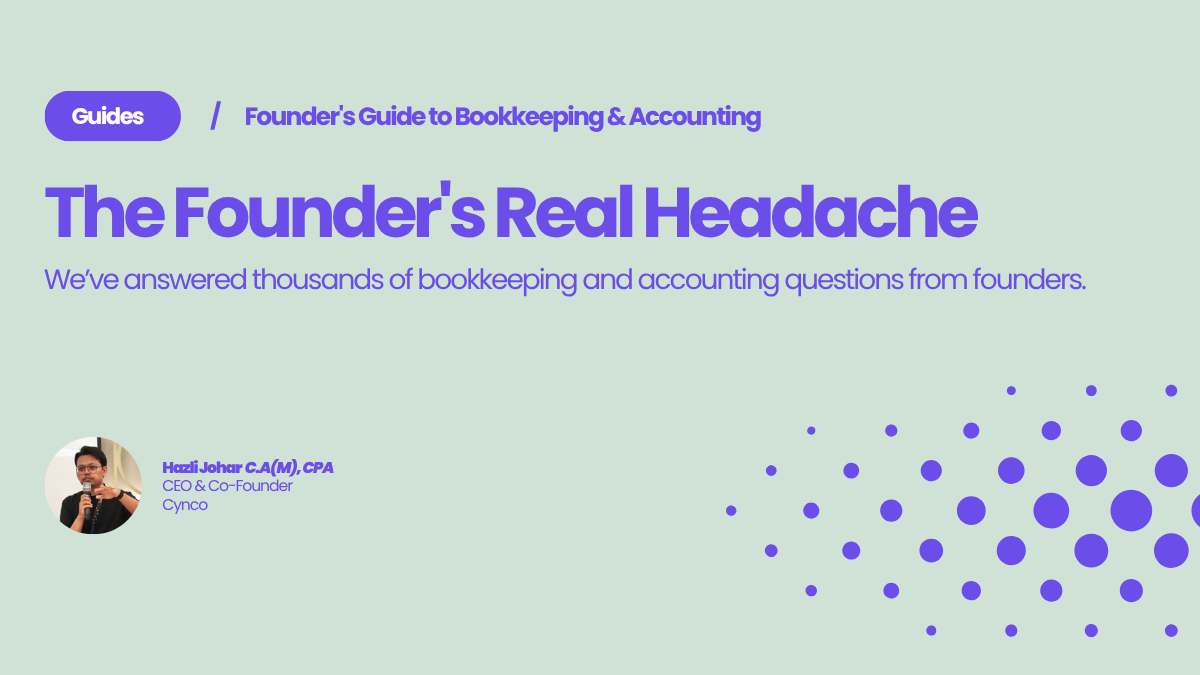
The Problem that always bordering founders - Bookeeping & Accounting
Do you know what's troublesome for founders when running companies?
It's not the math. Anyone building something can figure out the numbers, the costs. They have to, or they won't last. The feasibility, the strategy – that's table stakes. You get that wrong, you're out.
But there's a bigger, less obvious problem that gets every founder. Every year, you have to report your income. For some, it means showing your latest financials to stakeholders. When that time comes, you're forced back to basics. You have to really understand how your business runs, how you collect and store your documents and data. Most founders think they know. Then there are those who don't even grasp the impact of what's happened: the financial impact, the tax impact, the accounting impact. It's far more than just making a sale and paying a bill.
Three decades ago, businesses used paper to track everything. Surprisingly, some still do. They manually record transactions on paper. This might seem redundant, but it's often up to governments to push for change, to promote policies that force businesses into the digital age. They could offer options to convert to digital files or move to the cloud.
The Evolution of Record Keeping
Two decades ago, spreadsheets became the norm. Microsoft blew up, and suddenly everyone was using Excel. Even today, spreadsheets are powerful and relevant. With the right integrations, they can still do a lot.
Then, a decade ago, accounting software started to appear. While some developed countries moved quickly to cloud solutions like Xero, many still relied on server-based desktop software. Around 2017, cloud accounting really started gaining traction, especially with accounting firms serving their clients. But even then, many were skeptical. Security concerns were common. People simply didn't know how to use it. Even accountants were just figuring it out.
The AI Shift
The post-COVID era, with the advent of ChatGPT, changed things. We've seen accountants, operators, and accounting firms get creative. They're using AI to speed up bookkeeping and accounting. Whether it's spreadsheets, CRMs, or cloud accounting, they're leveraging AI tools to run more effectively. Is it productive? Is it cost-efficient? Most say yes, if it gets the job done. That's not surprising. Accountants, by nature, are careful and conservative. They're about compliance, not innovation. Quality and accuracy are non-negotiable. So, change takes time for them.
The Founder's Dilemma
For founders just starting out, picking the right solution for data collection, ingestion, reconciliation, bookkeeping, accounting, and reporting is a nightmare. It's all fragmented. That's the word for the last few decades. It's a problem many don't want to admit, but they bite the bullet. "As long as we can make it happen," they say, "who cares if it's fragmented?" This mindset has cost hundreds of billions of dollars over the years because people ignored it.
When founders say they've subscribed to cloud accounting software like Xero or QuickBooks, their next question is often, "Which plan do I need to pay for to get the work done?" Other founders will recommend what worked for them. Accountants might suggest something that fits their own firm's needs, often hoping to make you a client. Software companies promise everything, but as of today, a truly all-in-one solution is unlikely.
The problem is fragmentation. We lack an infrastructure that funnels all data from day one of a business, identifies and classifies it, performs accounting reviews, and reports according to standards. So, founders pay for software, but often end up doing things wrong. It's not their fault. They don't know how to use it, or more simply, they aren't accountants. They don't know how to ensure compliance and often miss crucial details beyond simple errors. Why? Because accounting software is built for accountants, not founders.
The Outsourcing
Some founders take the easy way out: they outsource to an accounting firm. This can seem like the best decision. You get an expert outside your company to handle it. But consider this: How fast can they deliver? Are you just one of many clients in their queue? If you can wait, fine. If you need it fast, you'll pay more. That's the accounting firm business model, and it's unpredictable. Startups rarely have money to burn on something that doesn't directly drive growth.
And what about your data security? What if the accounting firm outsources to someone else? Do you know? How do they protect your data? Do you really know what's happening behind the scenes?
For decades, founders have had limited, often bad, options. Understanding this problem is critical. Founders run companies for a long time; some are even repeat founders. So, recognize the problem, and then you can find the best solutions out there.
Cynco
Cynco is building an AI-native accounting infrastructure. From data collection to reporting, we've thought deeply about how founders can understand their company's financial health, without needing to be accounting experts. We're building for founders, and also for accounting firms, making it seamless for them to work together. This frees them up for strategic work, instead of time-consuming, stressful, and expensive data entry and accounting judgment calls.
Sign up at Cynco.io for early access. We aim to solve this global issue, to change lives and make everyone more productive.
